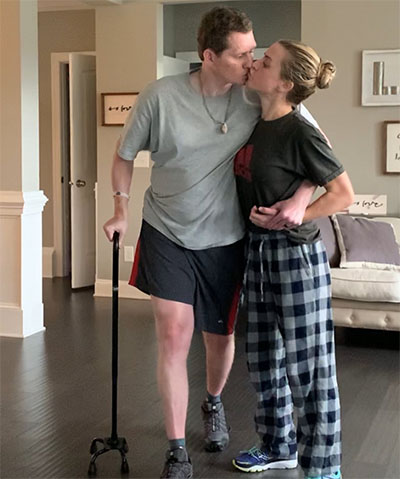Independence Program Helps Warrior and Caregiver Find Joy in Rehab Journey

Laura and Jonathan Grant met when Jonathan’s duty station transferred to Fayetteville, North Carolina. Laura was a Pilates instructor in her own studio nearby. The two quickly realized they had found a soulmate in each other and were married a few years later.
They shared love, faith, and a blossoming marriage that worked around Navy Seal deployments (twice to Iraq and once to Yemen) and Laura’s business. Then, one night, right before their fifth wedding anniversary, Laura received a phone call from the local hospital. Jon had been a passenger in a car that flipped over and hit a tree.
Jon’s brain and brain stem were severely injured. He was unresponsive and doctors expected him to remain unable to move and speak. The hospital staff started asking about the possibility of organ donation. Laura heard “this is it,” more times than she can count, but she never gave up on Jon.
He spent the next two years in a hospital. When Jon came home with Laura, he was still unable to move on his own or communicate. As a spouse and caregiver, Laura has taken tragic moments and squeezed joy out of them. She celebrates every small step and big milestone and has even found ways to engage Jon in therapy so it’s less of a chore and more like play.
In the process, Laura has become more than a soulmate to Jon. She is his in-home therapist, advocate, and best friend through a long and difficult journey. She is with him 24/7.
“I believe we have a choice in life: love or fear,” Laura said. “I focus on living in love and, in doing so, life is filled with light that carries me through the challenges my husband and I face together.”
Neurological rehab can be grueling, so along the way, Laura’s support has come from family, church, community, and veterans service organizations like Wounded Warrior Project® (WWP).
“The Independence Program at Wounded Warrior Project has been a blessing in our lives,” Laura said. “It has provided resources to alternative therapies that we wouldn’t have access to without outside help. The Independence Program team is very helpful in navigating and coordinating services, and that’s a huge assistance to me as a caregiver.”
WWP’s Independence Program helps Jon and Laura with caregiver relief through a physical therapist who comes to their home, and access to alternative treatments, including music therapy.
The program helps veterans with brain injuries and neurological conditions – whether caused by combat injuries or medical issues – such as multiple sclerosis, stroke, and seizure disorders – live as independently as possible. By working with warriors, families, caregivers, and WWP-provided support, Independence Program helps craft care plans and goals that fit the individual objectives of injured veterans and their families.
Bringing Back the Joy in His Eyes
Stimulating someone’s brain to heal requires around-the-clock attention. Laura uses her knowledge of Pilates to augment Jon’s rehab and finds ways to make therapy fun for him. Laura shares her caregiver journey – and Jon’s progress – with about a million followers on social media. She receives in-person and virtual encouragement from people who are inspired by the way Jon interacts with others – whether kicking a soccer ball in the yard or playing with their dog Kiah.
Despite the initial forecasts, Jon is doing things he was not expected to do – like walking with assistance and communicating.
“Each time I see the joy in his eyes it reminds me how far he has come,” Laura said. “How each step led us to where we are today and where we are going. I am blown away by how much he has progressed. Each year I look back and reflect on how much he has changed. What brings me the most peace and perseverance is knowing God has paved the path.”
Laura is mindful of her own physical and mental wellness. When she has a chance to take a break, she does Pilates, goes for a quick run, and finds ways to reduce stress. When they are together, Jon and Laura make each other smile. Sometimes, it will be Jon who playfully shoots a nerf toy at Laura, sometimes they dance, or play word games. They go through the alphabet and say a positive word for each letter. Other times, they go outside and focus on nature.
Laura gives him space to be spontaneous and playfully try new things. She also provides structure and uses techniques learned from doctors and therapists to find ways to exercise his brain and cognitive functions. Having WWP’s Independence Program as an ally has helped expose Jon to new things.
A warrior does not have to depend on another person to receive assistance from WWP’s Independence Program, and the injury does not have to be combat-related. The program adapts to veterans’ ever-changing needs and medical conditions. The tools and resources offered change with the warrior’s progress.
WWP’s commitment to helping warriors receive the care and support they deserve extends for a lifetime. WWP aims to ensure the most severely injured and ill veterans and their families receive supplemental services, home care, transportation, and additional resources in the event caregivers are no longer able to provide care and support.
To learn more about the Independence Program and other services available to injured veterans and their caregivers, contact the WWP Resource Center at 888.WWP.ALUM (888.997.2586) or resourcecenter@woundedwarriorproject.org.
Get connected today or read more about how WWP helps.
Contact: Raquel Rivas – Public Relations, rrivas@woundedwarriorproject.org, 904.426.9783
About Wounded Warrior Project
Since 2003, Wounded Warrior Project® (WWP) has been meeting the growing needs of warriors, their families, and caregivers — helping them achieve their highest ambition. Learn more.